OSVVM
Events
-
-
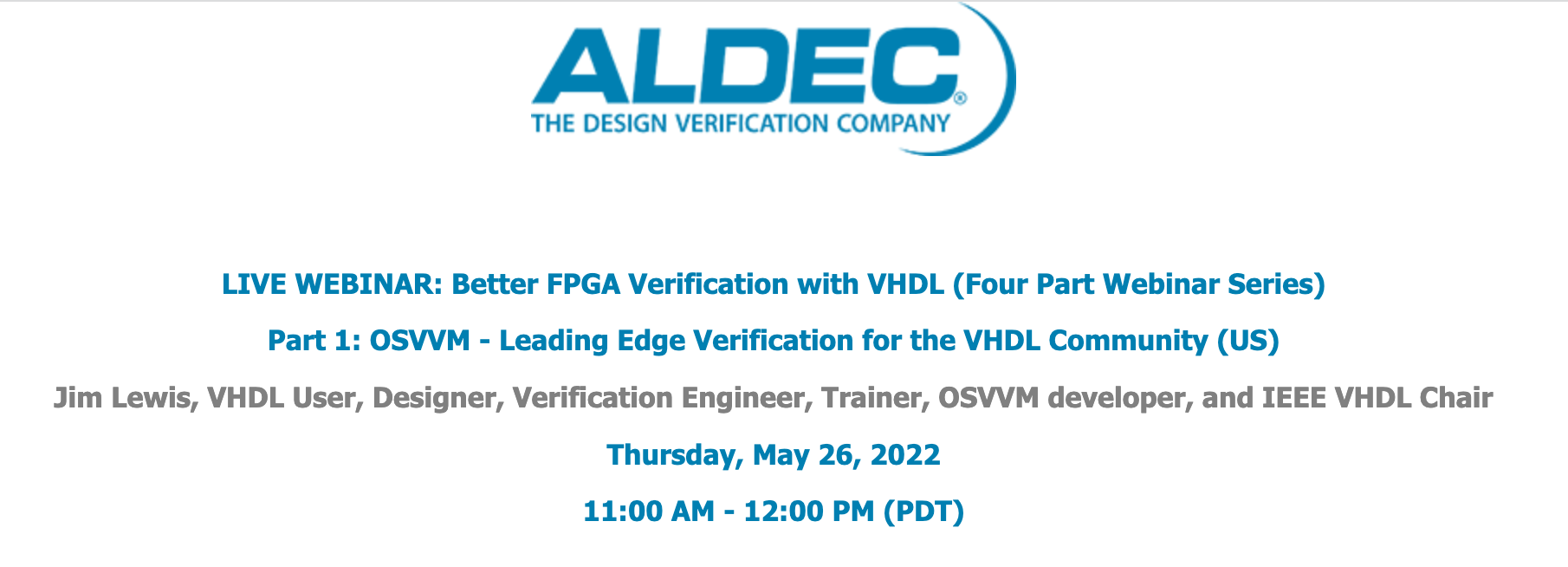
Better FPGA Verification with VHDL: OSVVM – Leading Edge Verification for the VHDL Community
OSVVM is an advanced verification methodology that defines a VHDL verification framework, verification utility library, verification component library, and a scripting flow that simplifies your FPGA verification projects from start to finish. Using these libraries, you can create a simple, readable, and powerful testbench that is suitable for either simple or complex FPGA blocks. Looking… Better FPGA Verification with VHDL: OSVVM – Leading Edge Verification for the VHDL Community
-
-
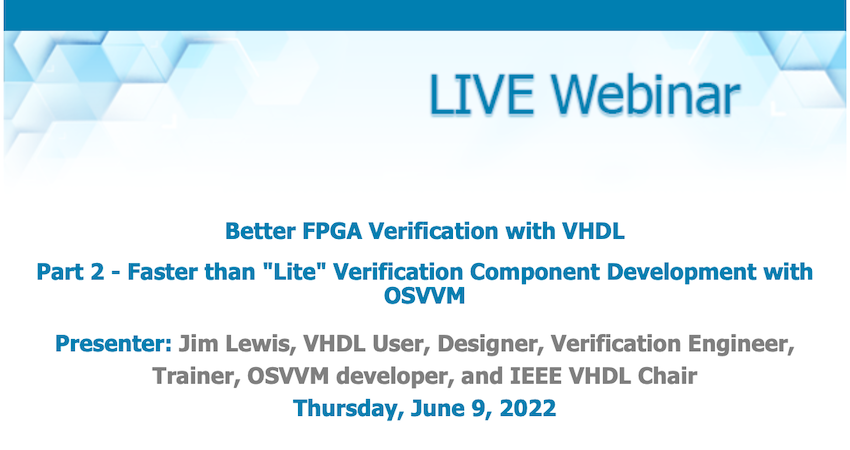
Better FPGA Verification with VHDL – Faster than “Lite” Verification Component Development with OSVVM
Some methodologies (or frameworks) are so complex that you need a script to create the initial starting point for writing verification components, test cases, and/or the test harness. SystemVerilog + UVM is certainly like this. There are even several organizations that propose that you use their "Lite" or "Easy" approach. Creating a verification component (VC)… Better FPGA Verification with VHDL – Faster than “Lite” Verification Component Development with OSVVM
-
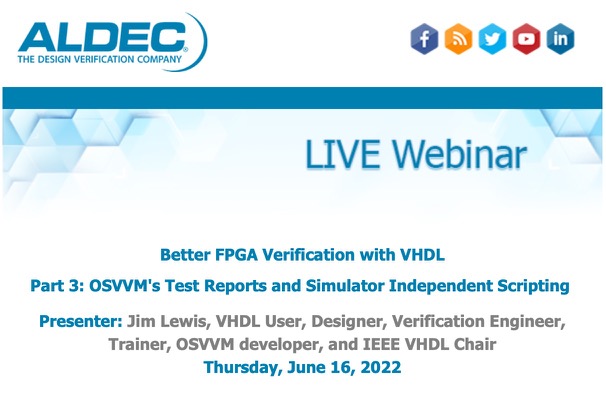
OSVVM’s Test Reports and Simulator Independent Scripting
According to the 2020 Wilson Verification Survey FPGA verification engineers spend 46% of their time debugging. As a result, we need good scripting to simplify running tests and good reports to simplify debug and help find problems quickly. Scripting can be complicated no matter what language – particularly with EDA tools that need to stay… OSVVM’s Test Reports and Simulator Independent Scripting
-
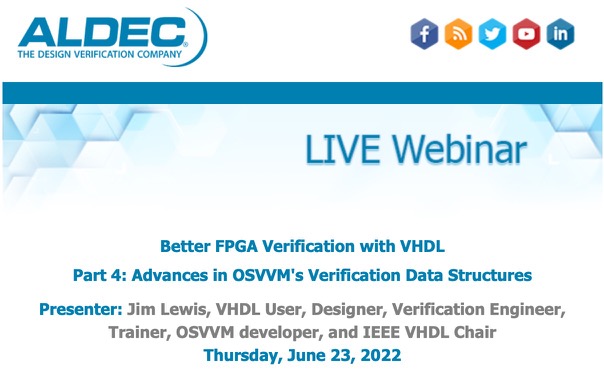
Advances in OSVVM’s Verification Data Structures
OSVVM has grown tremendously over the last couple of years. This period saw simulator independent scripting, test reporting, model independent transactions, virtual transaction interfaces, and additional verification components, each added and incrementally improved. We have talked about these previously in this webinar series. This webinar focuses on advances in OSVVM data structures. OSVVM's Functional Coverage,… Advances in OSVVM’s Verification Data Structures
-
-
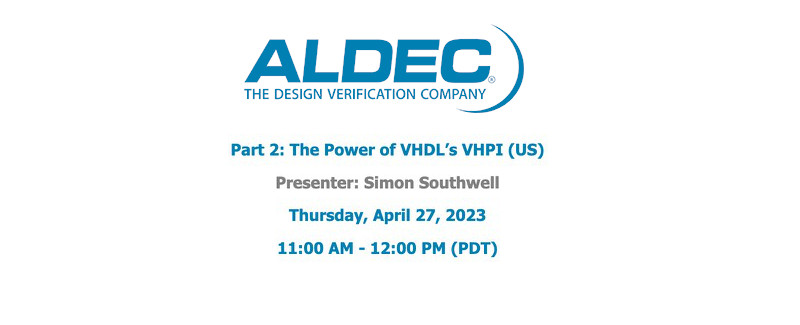
The Power of VHDL’s VHPI
The programming interfaces of logic simulators are largely the domain of specialists writing proprietary tools and extensions and are only vaguely in the consciousness of many design and verification engineers, if aware at all. Yet the simplest use of such interfaces opens up a whole world of possibilities in extending what is achievable in verifying… The Power of VHDL’s VHPI
-
-

Verification Futures 2023 UK
University of Reading Whiteknights Campus Park House, Reading, United KingdomThe Verification Futures conference provides a unique blend of conference presentations, exhibitions, training and industry networking sessions dedicated to discussing the challenges faced in hardware and software verification. Verification Futures provides a unique opportunity for end-users to define their current and future verification challenges and collaborate with the vendors to create solutions. It also provides… Verification Futures 2023 UK
-
-
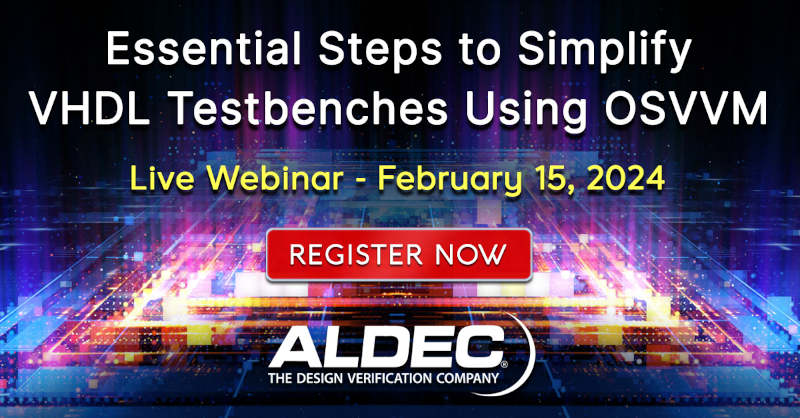
Essential Steps to Simplify VHDL Testbenches Using OSVVM
This “Getting Started” webinar focuses on the first, essential steps you need to take when looking to improve your VHDL testbench approach. In this webinar we examine transaction-based testing, self-checking tests, messaging, reports, and Open Source VHDL Verification Methodology (OSVVM) helper utilities. The “transaction” in transaction-based testing is just a fancy word for an… Essential Steps to Simplify VHDL Testbenches Using OSVVM
-
-

Why Should Our Team be Using VHDL + OSVVM for Verification?
Abstract: This is a high-level presentation that identifies the key aspects of a modern verification methodology and shows how to achieve them with OSVVM. This is a great presentation to share with your management about why OSVVM (and OSVVM training) is important for your team. Description: Developing and deploying a verification methodology can be costly… Why Should Our Team be Using VHDL + OSVVM for Verification?
-

Using OSVVM’s AXI4 Verification Components: Pt 1 Creating the AXI4 Testbench / Test Harness
European Session Abstract: This “Getting Started” presentation is for engineers who need to use the OSVVM AXI4 verification components (VCs) in their testbenches. Part 1 of this presentation provides a detailed walkthrough of creating a testbench environment that uses AXI4 VCs. AXI4 VCs are probably the most complex VCs in the OSVVM library. This complexity… Using OSVVM’s AXI4 Verification Components: Pt 1 Creating the AXI4 Testbench / Test Harness
-
-

Using OSVVM’s AXI4 Verification Components
Abstract: This “Getting Started” presentation is for engineers who need to use the OSVVM AXI4 verification components (VCs) in their testbenches. Part 2 of this presentation focuses on how to write tests and configure the AXI4 VCs. AXI4 VCs are probably the most complex VCs in the OSVVM library. This complexity is due to the… Using OSVVM’s AXI4 Verification Components